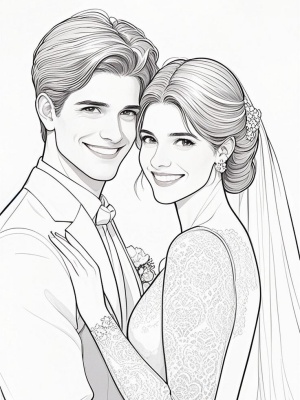The Art and Significance of Wedding Portraits
Introduction: Capturing Timeless Memories
Wedding portraits are more than just photographs; they are cherished keepsakes that immortalize one of life's most significant milestones. Unlike candid shots, these carefully composed images focus on the couple's emotions, style, and the essence of their relationship. Whether traditional or contemporary, wedding portraits serve as visual heirlooms that families treasure for generations. In this article, we explore the artistry, techniques, and emotional value behind these timeless images.
The Evolution of Wedding Portrait Styles
From Traditional to Modern Approaches
Wedding portrait styles have evolved dramatically over the decades. Traditional portraits often featured posed, formal compositions with classic backdrops. Today, couples opt for more natural, storytelling approaches that capture authentic emotions. Popular modern styles include:
- Fine Art: Soft lighting and painterly aesthetics
- Photojournalistic: Candid moments and genuine interactions
- Editorial: High-fashion inspired compositions
- Dark & Moody: Dramatic lighting and rich tones
For those seeking inspiration, our wedding photo style guide showcases various approaches to suit different personalities.
Technical Considerations for Perfect Wedding Portraits
Equipment and Lighting Essentials
Creating stunning wedding portraits requires technical expertise. Professional photographers typically use:
- Full-frame DSLR or mirrorless cameras
- Fast prime lenses (85mm f/1.4 is ideal for portraits)
- Off-camera flash systems for controlled lighting
- Reflectors and diffusers for natural light modification
According to Popular Photography, proper lighting setup can elevate a portrait from ordinary to extraordinary. The golden hour (just after sunrise or before sunset) provides particularly flattering natural light.
Problem-Solution Matrix for Common Challenges
Overcoming Wedding Portrait Obstacles
| Challenge | Solution |
|---|---|
| Unflattering poses | Guide couples with gentle direction and show sample poses |
| Harsh midday sun | Use open shade or create artificial shade with scrims |
| Nervous subjects | Engage in conversation to help them relax |
| Time constraints | Plan shot list in advance and work efficiently |
Creative Composition Techniques
Beyond technical aspects, artistic composition plays a crucial role in memorable wedding portraits. Consider these approaches:
- The Rule of Thirds: Position subjects off-center for dynamic balance
- Leading Lines: Use architectural elements to guide the viewer's eye
- Negative Space: Create breathing room around the couple
- Reflections: Incorporate water or mirror surfaces for added dimension
For more creative ideas, explore our wedding scene gallery featuring innovative portrait concepts.
Post-Production and Preservation
Enhancing and Protecting Your Images
Modern editing software allows photographers to perfect their wedding portraits through:
- Color correction and white balance adjustment
- Skin retouching (while maintaining natural texture)
- Selective focus and bokeh enhancement
- Creative toning and artistic effects
The Digital Picture recommends archiving high-resolution files in multiple locations to ensure these precious memories last a lifetime.
Conclusion: The Enduring Value of Wedding Portraits
Wedding portraits represent a unique fusion of technical skill and emotional storytelling. As photography technology advances, from high-resolution sensors to AI-assisted editing tools, the essence remains unchanged: capturing the love and connection between two people. Whether displayed in elegant frames, wedding albums, or shared digitally, these images become treasured family artifacts that grow more valuable with time.

For couples planning their special day, investing in quality wedding portraits ensures they'll have beautiful visual memories to complement their love story. Explore our gallery for inspiration on creating your own perfect wedding portraits.